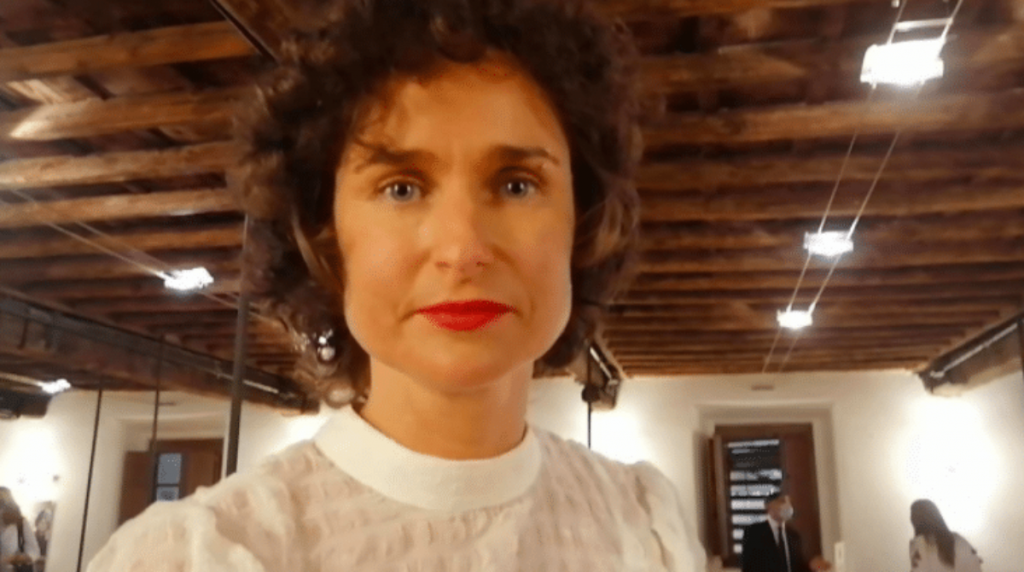“Don’t leave Belarus alone!” That was the message of a conference organised by New Europeans with human rights campaigners from Belarus, Ukraine and Russia to mark International Democracy Day, 15 September, writes Roger Casale.
In a moving address from her home outside Minsk, Olga Zubrilova, explained how she had become involved in the democratic movement in Belarus: “Until this spring I was not involved in politics. But then it looked as if we could change something. We had new candidates, people who spoke with dignity about our country and who gave us hope.”

Ekaterina Ziuziuk. a member of the Belarus diaspora based in Milan also took part in the meeting, and said: “We are in contact with Italian politicians and help Belarusian people to be heard in Europe. Our actions of solidarity are felt by Olga and those in the democratic movement in Belarus who ask us not to leave them on their own.”
The Belarus uprising is very different to what happened in Ukraine in 2012/13 but the attempted murder of Alexei Navalny has made clear that the crisis has to be seen as part of wider tensions in the region.
As former UN diplomat and Ukraine expert Bohdan Nahaylo emphasised, the protests are neither about the EU, nor directed against Russia: “Euromaidan was centred on Kyiv. In Belarus we see a nationwide wave of demonstrations. Mindsets have changed – things will never be the same again.
The strikes and the mobilisations followed by Kremlin-backed state repression recalls Solidarity in Poland, which celebrated its 40th anniversary this week.
Commenting on the Kremlin’s intentions, Oliver Védrine, a New Europeans director and Chief Editor of the Russian Monitor said: “Russia let go of Poland and Ukraine. But Putin cannot afford to lose Belarus.”
Regional elections in Russia on 13 September saw setbacks for the ruling United Russia party. Significant gains for local candidates from opposition parties resulted from the tactical or “smart” voting advocated by Navalny.
Meanwhile, protests in Khabarovsk, sparked by the arrest of the regional president there, are growing stronger in the wake of events in Belarus.

Speaking from Washington, Illya Ponomarev, a former Russian MP and the only MP to have voted against the invasion of Crimea in 2014 said: “The Kremlin is at a crossroads. Should it escalate the crisis by annexing Belarus? Or seek a compromise ahead of parliamentary elections in Russia next year? I think the decision is being made literally as we speak.”
Bill Bowring, Professor of Law at Birkbeck College, London and President of the European Lawyers for Democracy and Human Rights told the meeting: “Putin is unsure about the future and is feeling the tectonic plates shake beneath his feet. He knows what he sees in Belarus is coming to Russia, too.”
The role of the EU remains hesitant, despite a statement by Joseph Borrell, the High Representative, denouncing the Belarus elections as fraudulent and saying the EU does not recognise Lukashenko as the legitimate President of Belarus.

Maria Laura Franciosi, an independent journalist and the founding President of the Brussels Press Club said: “The courage and determination of the Belarus people is unquestionable and the EU must support them. But what the EU plans to do is still in the making.”
Those seeking a stronger stance from the EU include the president of Lithuania, Gitanas Naused. Commenting on the protests in Belarus he said: “Supporting the Belarusian opposition is a matter of principle and not a cost benefit analysis about the consequences of being at odds with Russia”.
In the absence of clearer leadership from the European Union, civil society inside and outside Belarus is mobilising to support the process of change there.
Wolfgang Ressmann manages the Media-Dialogue project for the German Foreign Office, which builds links with Eastern Europe including Belarus. Commenting on the need for European solidarity and bridge building he said: “Talk to each other, find out what we have in common, show how powerful democracy is, as we are seeing now from the heroic people of Belarus.”
One prominent feature of the Belarus revolution has been the role of women both in the movement inside the country and in the diaspora, as Kate Willoughby, a writer, actor and campaigner recalled. Addressing Olga Zubrilova and Katerina Ziuziuk. directly, Kate Willoughby said: “You are inspiring and formidable. I see the same courage, dignity and sense of solidarity radiating towards us from you as we feel from the suffragettes.”
Quoting suffragette Emily Davison, who died in 1913, Kate Willoughby added: “Courage calls to courage everywhere, and its voice cannot be denied.”
Writer and priest the Rev. Marie-Elsa Bragg, a friend of Ukraine and Belarus, sign-posted the role of the theatre and the arts in Belarus, “The arts can be very loud when political journalism is shut down.”
Closing the event, Olga Zubrilova., Ekaterina Ziuziuk. and Maria Laura Franciosi called on citizens and civil society to keep building networks to sustain the Belarus democracy movement both inside and outside the country. Olivier Védrine said: “New Europeans will continue to work with the democracy movements in Belarus and Ukraine and the Russian opposition and to promote dialogue.”
It is time for all democrats to stand up for the shared values of equality, freedom and human rights, the foundations of our common European home.
Stand with Belarus. Don’t leave the people of Belarus alone.
The Author, Roger Casale, is the Founding Director of New Europeans.




